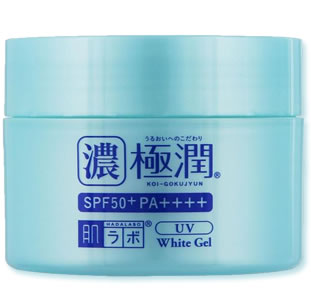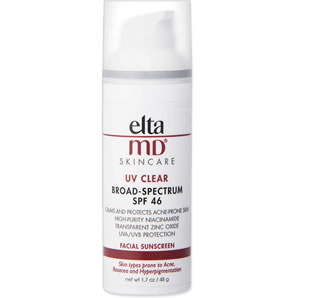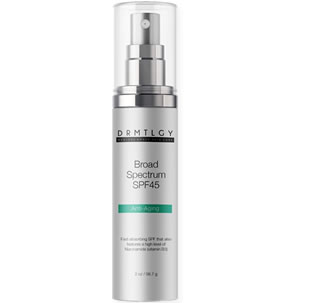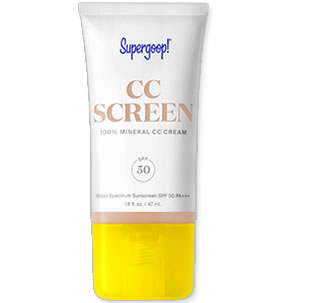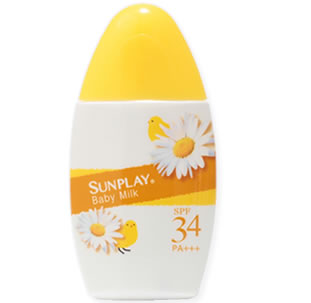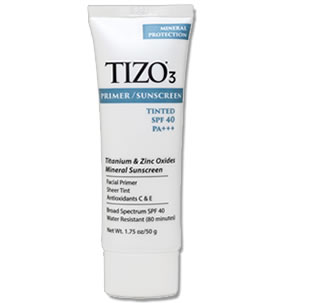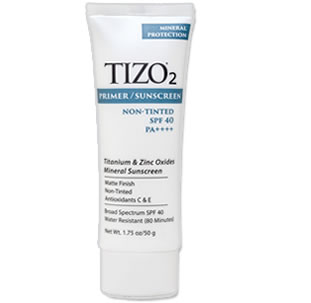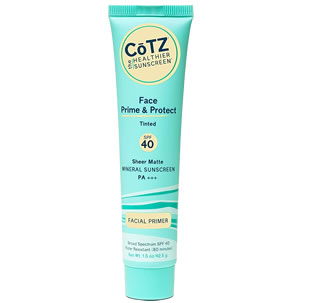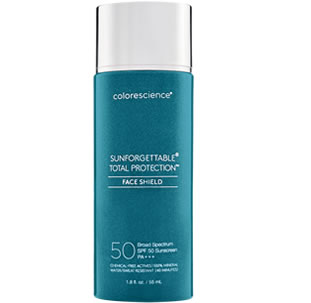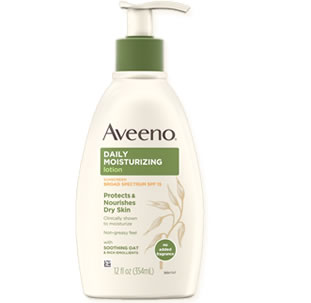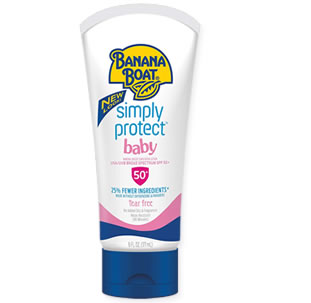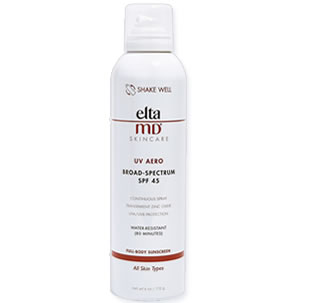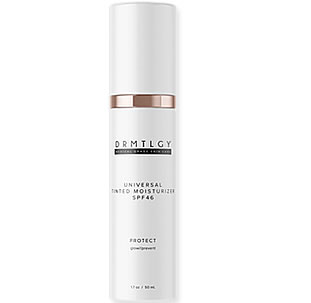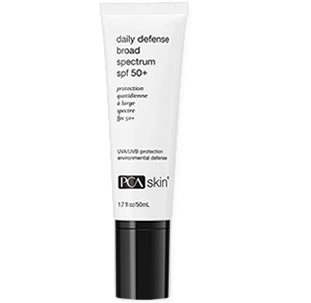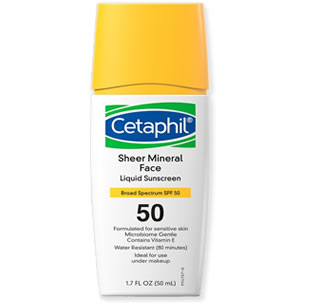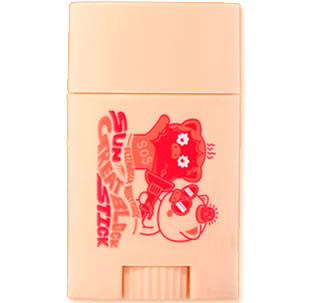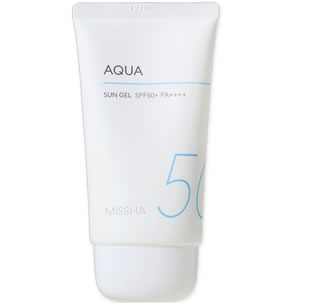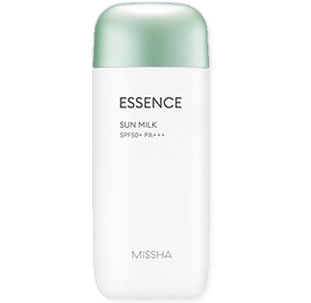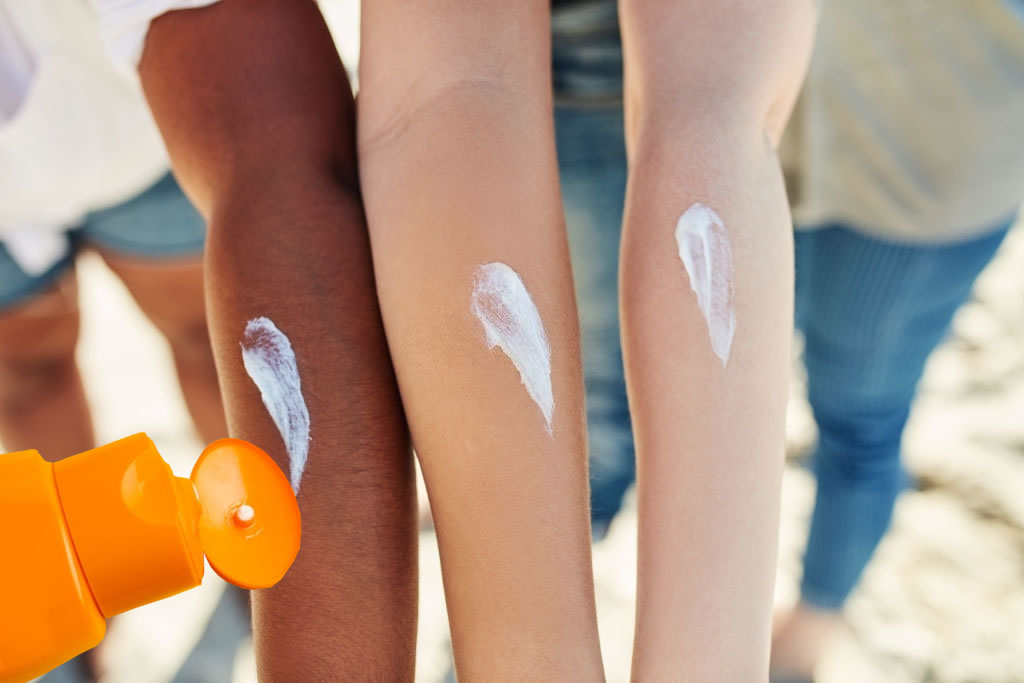
Table Of Contents
- Round up of the best sunscreens for fungal acne
- What are sunscreens?
- SPF definition, what does SPF stand for?
- What do sunscreens do?
- Who should use sunscreens?
- Where should I apply sunscreen?
- How should I use sunscreen?
- How should I use sunscreen?
- How should I use sunscreen?
- Why should people with fungal acne use sunscreen?
- Here are the 18 Top fungal acne safe sunscreens:
- 1. Hada Labo Koi-Gokujyun UV White Gel SPF 50+ PA++++
- 2. EltaMD UV Clear Facial Sunscreen Broad-Spectrum SPF 46 PA+++
- 3. DRMTLGY Broad Spectrum SPF 45 (Anti-Aging)
- 4. Supergoop CC Screen Mineral CC Cream SPF 50
- 5. ROHTO SunPlay Baby Milk
- 6. TIZO3 Facial Primer/Sunscreen Tinted SPF 40 PA+++
- 7. TIZO2 Facial Primer-Sunscreen Non-Tinted SPF 40
- 8. CoTZ Face Prime & Protect Tinted SPF 40 PA+++
- 9. Colorescience Sunforgettable Total Protection Face Shield SPF 50
- 10. Aveeno Daily Moisturizing Body Lotion with Broad Spectrum SPF 15 Sunscreen
- 11. Banana Boat Simply Protect Baby Sunscreen Lotion SPF 50
- 12. EltaMD UV Aero Broad-Spectrum SPF 45
- 13. DRMTLGY Anti-Aging Tinted Moisturizer with SPF 46
- 14. PCA Skin Daily Defense Broad Spectrum SPF 50+
- 15. Cetaphil Sheer Mineral Face Liquid Sunscreen SPF 50
- 16. Elizavecca Milky Piggy SUN Great Block Stick SPF 50+ PA+++
- 17. Missha All Around Safe Block Aqua Sun Gel SPF50+/PA++++
- 18. Missha All Around Safe Block Essence Sun Milk SPF50+ PA+++
- Conclusion
Round up of the best sunscreens for fungal acne
If you suffer from acne or fungal acne, you know how difficult it is to find effective moisturizers and sunscreens that do not irritate your skin or break you out.
Compounding this situation is that many people already skip moisturizers and sunscreens in their skincare routines because they feel too ‘heavy’ or ‘greasy’ on their skin.
Today’s beauty and personal care isles have a plethora of sunscreen products, and it can be very overwhelming to pick the right kind of sunscreen that will safeguard your skin from the sun.
Even when one has found the perfect sunscreen, there is every chance that one will apply it incorrectly.
It might even seem complicated and burdensome, but applying sunscreen isn’t difficult at all—and it’s certainly beneficial to your skin.
We understand the frustrations of picking a good moisturizer and sunscreen. So, we have put together a stellar line-up of some of the best fungal acne safe sunscreens available.
And you can find our round-up of the best moisturizers for fungal acne right here.
What are sunscreens?
Sunscreens are topically applied creams, lotions, gels, sprays, or sticks that contain active ingredients that protect your skin from the sun’s UV radiation. Some sunscreens also double as moisturizers.
There are two types of sunscreens. They include:
Physical (mineral) sunscreen
These sunscreens contain popular ingredients like zinc oxide and titanium dioxide. Some physical sunscreens contain iron oxide, which can protect the skin against blue light.
The job of these ingredients is to block and deflect the harmful UV rays before they get absorbed by your skin.
Chemical sunscreen
These sunscreens contain ingredients like Avobenzone and Octisalate. These ingredients absorb UV rays before they can damage your skin.
A study conducted by the Canadian Medical Association shows that physical sunscreens are not organic or more natural than chemical sunscreens. Every active ingredient in a sunscreen is derived chemically.
The ingredients in physical sunscreens are actually inorganic mineral compounds. The ingredients in chemical sunscreens are actually organic UV filters.
Although physical sunscreens likely cause less irritation than chemical sunscreens, both sunscreens have been proven to be safe and effective. In fact, there are many hybrid sunscreen products on the market that feature both physical and chemical sunscreen ingredients.
The Skin Cancer Foundation states that the safest and most active protection is one that is broad-spectrum and has an SPF of 15 or higher. The sweet spot, though, is SPF 30. That’s the magic number.
SPF definition, what does SPF stand for?
SPF is an acronym for Sun Protection Factor, which is a measure of how effective a sunscreen is at protecting the skin from UVB rays (the radiation that causes sunburns and skin cancer).
If your skin normally burns after 10 minutes of sun exposure, an SPF 15 sunscreen will let you stay protected in the sun for about 150 minutes, which is 15 times longer. An SPF 30 will let you stay protected in the sun for about 300 minutes.
SPF is not meant to help you calculate how much time to spend in the sun because your duration of sun exposure depends on your skin type, how intense the sunlight is, and the quantity of sunscreen applied.
SPF 15 blocks 93% of UVB rays, SPF 30 blocks 97% of UVB rays, and SPF 50 blocks 98% of UVB rays. This means that an SPF 30 sunscreen does NOT give you twice more protection than an SPF 15 sunscreen. Instead, SPF 30 sunscreen gives you only 4% more protection than SPF 15 sunscreen.
What do sunscreens do?
Sunscreens work a lot of remarkable and irreplaceable wonders on your skin. In fact, without sunscreen, your skincare routine might work negatively on your skin rather than positively.
Below are five benefits of sunscreens.
1. Sunscreens prevent premature aging.
There are two culprits of aging. There is intrinsic aging, the one caused by genetics. And there is extrinsic aging, the one caused by excess exposure to harmful sun rays, pollution, chemicals, and other environmental stressors.
It turns out that extrinsic aging caused by sun damage is one of the most common causes of premature aging. UV radiation can cause collagen and elastin in the skin to break down prematurely, which results in fine lines and wrinkles.
Melanocytes—the pigment-producing cells in the skin—can also be damaged by excess UV radiation, which results in the production of excess melanin (hyperpigmentation).
When you use sunscreen consistently, your skin tends to be smoother and more youthful-looking for longer.
2. Sunscreens reduce hyperpigmentation.
Too much exposure to the sun can cause uneven skin tone. As mentioned earlier, sun exposure can stimulate melanocytes in the skin to produce excess melanin. When this happens, your skin develops dark patches because of the change in melanin production. This is known as hyperpigmentation.
People with darker skin are naturally more likely to develop hyperpigmentation.
When sunscreen is applied regularly, it inhibits the excess production of melanin, keeping the dark patches away and making your skin even-toned.
P.S.: Some people think that you don’t need to wear sunscreen if you have a darker skin tone because you don’t burn easily. However, this is entirely false. Even if you don’t get sunburns, your skin can still be damaged by the sun.
3. Sunscreens decrease the risk of cancer.
This is the number one reason you should make proper sunscreen application a priority. Daily use of sunscreen, even on cloudy and rainy days, can help protect your skin from the harmful sun rays that cause skin cancer.
Sunscreens are beneficial to protect your skin from melanoma, the deadliest type of skin cancer. It also protects against basal cell skin cancer and squamous cell skin cancer.
These cancers are usually caused by UV radiation. Proper and regular protection from these harmful rays helps lower your risk of developing these cancers. That’s why it is essential to use sunscreen every day.
4. Sunscreens can prevent brain damage and skin irritation.
While most people apply sunscreen to prevent painful sunburns, sunscreens also protect you against heat exhaustion that can result in brain damage.
Sunscreens can also prevent irritation in people with photosensitive skin conditions like lupus and rosacea. When exposed to the sun, people with these conditions may develop red, burning skin, and the condition’s severity may increase.
To avoid all these, you must apply adequate sunscreen. If you’ve been in direct sunlight for an extended period of time, find a shade.
Who should use sunscreens?
Everybody should use sunscreens! Anyone—man, woman, child—over six months of age should use sunscreen every day. It does not matter whether you tan easily or not; you can still get sun damage from too much exposure to the sun.
The only exception to the ‘everybody rule’ for sunscreen-wearing is babies under the age of 6 months. Sunscreen should not be applied to their bodies because their skins are very sensitive.
It is best to keep babies out of the sun to avoid sun damage. The best ways to protect infants from the sun’s harmful rays are shade structures and protective clothing.
Where should I apply sunscreen?
Many people who wear sunscreen only apply it to their faces and necks. But the face and neck are not the only areas that can be damaged by the sun, are they?
The whole body is susceptible to skin damage from sun exposure. Therefore, dermatologists recommend that sunscreen be applied to every inch of your body before you wear your outfit of the day. This ensures that your skin is protected if you have to remove layers of your clothing.
How should I use sunscreen?
It’s one thing to apply sunscreen. It’s quite another to apply it correctly. Many people make the mistake of applying sunscreen like a mere moisturizer. Even though many sunscreens in the market double as moisturizers, they should be applied in a larger quantity than normal moisturizers.
This study conducted by the Canadian Medical Association showed that people generally apply less than half the amount of SPF needed to adequately protect the skin.
One ounce (a full shot glass) of sunscreen is sufficient for your entire body. Many ardent sunscreen-wearers use the three-finger rule to apply sunscreen on their faces. The three-finger rule involves squeezing the sunscreen down the lengths of your index, middle, and ring fingers.
This quantity is generally the right one for your face and neck. However, some good sunscreens have been shown to leave a white cast when used in that much quantity.
If your sunscreen or sunblock does not blend completely or leaves you with an unappealing white cast after applying sufficient amounts,
Drmtlgy SPF 45 sunscreen or Supergoop CC screen SPF50 are two good fungal acne-safe alternate options to try.
For removing sunscreens, particularly sunblocks with a physical or mineral base. A gentle daily fungal acne-safe facial cleanser and an oil-based pre-cleanser like Malezia Cleansing Balm or Purified MCT Oil are recommended.
How should I use sunscreen?
There are certain labels and tags you should look for before you choose sunscreen for yourself. This extra information, usually written on the product’s container, can give you an idea of just how much the sunscreen will protect you from the sun.
According to another study, the four factors listed below should be considered when selecting a sunscreen.
1. Broad-spectrum protection
Not too long ago, most sunscreens claimed to protect the skin only against UVB rays (the ones that cause sunburns and skin cancer) and not UVA rays (the ones that cause tanning and premature aging).
UVA rays are known to be very dangerous, and sunscreens have been formulated to protect the skin against UVA and UVB rays.
This kind of all-around sunscreen is known as broad-spectrum sunscreen. Most broad-spectrum sunscreens have that written on their product labels.
2. SPF 15
As mentioned earlier, SPF 15 offers about 93% of protection from sun damage. However, it is considered the weakest SPF. It is only effective for occasional sun exposure like running a quick errand or walking your dog.
3. SPF 30 or higher
Sunscreens with SPF 30 or higher provide 96-98% protection from sun damage. These sunscreens are best suited for prolonged outdoor activities. When you stay long hours in the sun or engage in outdoor sports like swimming, hiking, and long-distance running, you should use sunscreen with SPF 30 or higher.
4. Water-resistant or very water-resistant
This one is essential when you engage in swimming or intense exercise that can cause you to sweat profusely. There is no such thing as waterproof sunscreen; all sunscreens eventually wash off (hence the need to reapply every two hours).
However, sunscreens labeled water-resistant have been shown to be effective for up to 40 minutes of swimming. Very water-resistant sunscreens are active for up to 80 mins in the water.
If you’re going to be indoors throughout a particular day with short intervals of sun exposure, an SPF of 15 or higher is advised. If you’re going to spend most of your time outdoors, especially in the scorching sun, water-resistant sunscreen of SPF 30 or higher is advised.
How should I use sunscreen?
Many people who wear sunscreen only apply it to their faces and necks. But the face and neck are not the only areas that can be damaged by the sun, are they?
The whole body is susceptible to skin damage from sun exposure. Therefore, dermatologists recommend that sunscreen be applied to every inch of your body before you wear your outfit of the day. This ensures that your skin is protected if you have to remove layers of your clothing.
Why should people with fungal acne use sunscreen?
Many people with fungal acne have sensitive skin. Fungal acne itself is a condition that requires you to be careful with what you apply to your skin.
Products that work positively for people without fungal acne might aggravate fungal acne. This is why we created our nifty skincare ingredient checker to assist you in sifting and sorting through the products that are safe to use and those that are not.
For some individuals, too much exposure to the sun without protection can cause these fungal acne symptoms such as redness and itching to worsen. As a result, protecting fungal acne-prone skin from the sun’s harmful UV rays is critical.
However, just as sunscreen is important, vitamin D is also vital for the skin and bones. A couple of studies [1, 2] demonstrates that adequate sunlight exposure can inhibit Malassezia’s growth the yeast responsible for fungal acne.
So, if we are to put this study into practice, perhaps one approach to help us find common ground in maintaining a balance between your exposure to sunlight and your protection from it could be 10-15 minutes of sunbathing without sun protection each day.
Caution
Be smart. If your skin is extremely sensitive or easily burns in direct sunlight, this method may not be for you, and you’re probably better off protecting your skin from the sun.
The takeaway is that 10-15 minutes of sun exposure can help with vitamin D production and fungal acne (malassezia folliculitis) symptoms.
Here are the 18 Top fungal acne safe sunscreens:
Affiliate Disclosure: We may earn a small commission if you buy products through our links.
1. Hada Labo Koi-Gokujyun UV White Gel SPF 50+ PA++++
This gel-based sunblock contains a blend of highly effective physical and chemical UV ray filters: Titanium Dioxide, Octinoxate, Ethylhexyl Methoxycinnamate, Polysilicone-15, Bis-Ethylhexyloxyphenol Methoxyphenyl Triazine, and Titanium Oxide.
This sunscreen is also formulated with hyaluronic acid and magnesium ascorbyl phosphate (MAP), a vitamin C derivative. Hyaluronic acid hydrates the skin deeply, while MAP acts as an antioxidant, offering anti-aging and skin-brightening benefits.
This sunscreen can be worn well under makeup, is friendly to these skin types (sensitive, combination, normal, dry), and does not leave a white cast.
This product is free of synthetic fragrances and oils.
We recommend removing this sunscreen gel with a gentle cleanser at the end of the day. And for those concerned, this product is Niacinamide-Free & Glycerin-Free.
PROS:
- Fungal Acne Safe
- Fragrance-Free
- Oil-Free
- Non-comedogenic
- Recommended For These Skin Types:
Sensitive, Acne-Prone, Combination, Dry - No White Cast
- Not Reported to Pill
It would be best if you always made every effort to avoid getting this product into your eyes. However, it was reported to be non-stinging/burning.
CONS:
- Not Alcohol-Free
- Not Silicone-Free
- Not Water-Resistant
- Not Sweat Resistant
- Not Reef Safe
2. EltaMD UV Clear Facial Sunscreen Broad-Spectrum SPF 46 PA+++
This sunscreen lotion is formulated with 9% zinc oxide and 7.5% octinoxate, a combination of physical+chemial UV filters which help protect the skin from harmful UV rays.
This sunscreen soothes and protects sensitive skin with moisturizing and anti-aging ingredients like niacinamide, sodium hyaluronate, and lactic acid.
It is free of artificial fragrances, oils, parabens, and drying alcohols. This product comes highly recommended by dermatologists, leaves no residue, and may improve hyperpigmentation and rosacea.
This product may leave a white cast on deeper skin tones. Additionally, it may pill depending on usage and skin type.
If you’re having issues with pilling and white casts, these recommended sunscreens for fungal acne are a must-try since they aren’t known to cause these issues: DRMTLGY Anti-aging Clear Face Sunscreen SPF 45 & Hada Labo Koi-Gokujyun UV White Gel SPF 50+ PA++++.
When it comes to removing sunscreen at the end of the day, we recommend doing a double cleanse. This oil cleanser is our favorite for step one, and this is our go-to cleanser for step two. As a bonus, step one oil is highly effective against fungal acne.
More Info:
For those concerned, this product does contain Niacinamide and is Glycerin-Free. It is also non-tinted.
PROS:
- Fungal Acne Safe
- Fragrance-Free
- Alcohol-Free
- Oil-Free
- Recommended For These Skin Types:
Acne-Prone, Sensitive Combination, Dry - Protection Form Infrared
- Dermatologist Recommended
CONS:
- Not Water-Resistant
- Not Sweat Resistant
- Not Reef Safe
- Leaves A White Cast (Darker Skin Tones)
- May Pill
- Not Silicone-Free
It would be best if you always made every effort to avoid getting this product into your eyes. Because it is likely to sting/burn.
NB: While this may not apply to everyone, it’s important to note that lactic acid can sometimes cause allergic reactions in some people, particularly those with hypersensitive skin. Patch testing lactic acid before using it on your entire body is recommended if you’re unsure if this applies to you.
3. DRMTLGY Broad Spectrum SPF 45 (Anti-Aging)
This broad-spectrum sunscreen SPF 45 cream is a non-greasy sunscreen that protects against sun exposure and provides anti-aging effects.
This product contains powerhouse ingredients like knotweed extract, niacinamide, and sodium hyaluronate, which protect the skin from radiation, prevent premature aging, and hydrate the skin.
This sunblock cream is free of oils, silicones, synthetic fragrances, and alcohol. It is dermatologist-recommended and can be worn under makeup. This lightweight cream is suitable for all skin types, does not leave a white cast, does not pill, and reduces the appearance of redness.
More Info:
For those with sensitivity concerns, this product does contain Glycerin and Niacinamide and is made up of a combination of chemical and physical UV filters, namely zinc oxide and octinoxate. This formulation is non-tinted.
We recommend removing this sunscreen with a high-quality fungal acne-safe cleanser like this one at the end of the day.
PROS:
- Fungal Acne Safe
- Fragrance-Free
- Oil-Free
- Silicone-Free
- Alcohol-Free
- Non-Comedogenic
- Protection Form Infrared
- Dermatologist Recommended
- No White Cast
- Makeup Friendly
- Recommended For These Skin Types:
Sensitive, Oily, Acne-Prone, Combination & Dry
While this product is reported to be non-stinging/burning to avoid irritation and other adverse effects, do make every effort to prevent getting sunscreen or any other cosmetic product into your eyes.
Not Reported to Pill
CONS:
- Not Water-Resistant
- Not Sweat Resistant
- Not Reef Safe
4. Supergoop CC Screen Mineral CC Cream SPF 50
This fungal acne safe physical sunscreen cream is formulated with UV filters that reflect UVA and UVB rays (4 % titanium oxide, 20% zinc oxide).
It’s a lightweight cream-based sunscreen that can also be used as a buildable CC cream to conceal flaws and even out skin tone.
Capric/caprylic triglyceride, an antimicrobial ingredient, is also present in this mineral sunscreen. This ingredient helps to protect the skin from harmful bacteria and other microorganisms that can cause infections or irritation.
Although there have been no reports of this product stinging or burning the eyes, it may pill.
There are no fragrances or alcohol in this product. At the end of the day, we recommend removing this sunscreen with our favorite oil cleanser and the mildest water-based cleanser.
More Info:
For those concerned, this product does contain Glycerin and is Niacinamide-Free. Available in various colors to make skin color matching easier.
PROS:
- Fungal Acne Safe
- No Synthetic Fragrance
- Oil-Free
- Alcohol-Free
- Makeup Friendly
- Non-Comedogenic
- Recommended For These Skin Types:
(Sensitive, Acne-Prone, Combination, Oily) - No White Cast
- Reef Safe
It would be best if you always made every effort to avoid getting this product into your eyes. However, it was reported to be non-stinging/burning.
CONS:
- Not Silicone-Free
- Not Water-Resistant
- Not Sweat Resistant
- May Pill, Very Thick
5. ROHTO SunPlay Baby Milk
This Japanese sunscreen milk is formulated with physical UV filters (zinc oxide and titanium oxide), which help prevent UV rays from destroying the skin.
Dimethicone, glycerin, dipotassium glycyrrhizate, Sodium Hyaluronate, and Magnesium Ascorbyl Phosphate – MAP (Vitamin C) are among the moisturizing and anti-aging ingredients in this sunblock lotion.
It is reef-safe, water-resistant, hypoallergenic, and suitable for all skin types (especially babies and adults with sensitive skin).
It does not leave a white cast on darker skin tones and is free of oils, parabens, alcohol, and fragrances.
We recommend removing this product with our top oil cleanser and top gentle water-based cleanser.
NB: Consider buying multiple bottles as it comes in a small size. Getting at least three at a time has worked well for us.
Contains Glycerin, Does Not Contain Niacinamide.
PROS:
- Fungal Acne Safe
- Fragrance-Free
- Oil-Free
- Alcohol-Free
- Makeup Friendly
- Recommended For These Skin Types:
Sensitive, Acne-Prone, Oily, Combination, Dry - No White Cast
- Water-Resistant (40mins)
- Sweat Resistant
- Reef Safe
- Not Reported to Pill
It would be best if you always made every effort to avoid getting this product into your eyes. However, it was reported to be non-stinging/burning.
CONS:
- Not Silicone-Free
- Tiny Bottle Small Amount Of Product (Buy 2 or 3)
6. TIZO3 Facial Primer/Sunscreen Tinted SPF 40 PA+++
This eco-friendly, tinted sunblock is formulated with titanium dioxide and zinc oxide, providing extensive protection from harmful sun rays.
It contains great ingredients like dimethicone and tetrahexyldecyl ascorbate, which work to moisturize and brighten the skin. This lightweight physical sunscreen is dermatologist-recommended and is free from oils, fragrances, preservatives, and alcohol.
This mineral sunscreen is suitable for all skin types and is water-resistant and sweat-resistant for up to 80 minutes.
This Tizo sunscreen is makeup-friendly and does not leave a white cast on deeper skin tones.
The recommended method for thoroughly removing this sun cream without any unnecessary tugging or scrubbing of the skin is to use both an oil and a water cleanser.
And for those with sensitivity concerns, this product is both Niacinamide Free & Glycerin Free.
PROS:
- Fungal Acne Safe
- Fragrance-Free
- Oil-Free
- Alcohol-Free
- Dermatologist Recommended
- Recommended For All Skin Types:
Sensitive, Acne-Prone, Combination, Oily, Dry - No White Cast
- Makeup Friendly
- Water Resistant (80 mins)
- Sweat Resistant
- Reef Safe
- Not Reported to Pill
It would be best if you always made every effort to avoid getting this product into your eyes. However, it was reported to be non-stinging/burning.
CONS:
- Not Silicone-Free
7. TIZO2 Facial Primer-Sunscreen Non-Tinted SPF 40
This non-tinted sun cream is made up of both titanium dioxide and zinc oxide, which offer broad protection from the sun’s damaging rays.
This Tizo sunscreen contains great ingredients like tetrahexyldecyl ascorbate, brightens the skin, and reduces signs of aging.
It’s a lightweight sunscreen that is dermatologist-recommended and is free from fragrances, preservatives, oils, and alcohol.
It is suitable for all skin types and is sweat and water-resistant for up to 80 minutes. It can be worn under makeup as it has a velvety finish and does not pill.
This mineral sunscreen, however, might leave a minimal white cast on darker skin types.
Use a good oil cleanser and our best water-based non-foaming cleanser to remove this product from your skin at the end of the day.
This product is free of Niacinamide and Glycerin.
PROS:
- Fungal Acne Safe
- Fragrance-Free
- Oil-Free
- Alcohol-Free
- Water-Resistant (80 mins)
- Sweat-Resistant
- Reef Safe
- Makeup Friendly
- Not Reported to Pill
- All Skin Types:
Sensitive, Acne-Prone, Combination, Dry & Oily - Dermatologist RecommendedIt would be best if you always made every effort to avoid getting this product into your eyes. However, it was reported to be non-stinging/burning.
CONS:
- Not Silicone-Free
- Minimal White Cast (Deeper Skin Tone)
8. CoTZ Face Prime & Protect Tinted SPF 40 PA+++
This mineral/physical sunscreen contains titanium dioxide and zinc oxide, which help to protect the skin from cancer and premature aging by reflecting UV rays.
This Cotz sunscreen is made up of ingredients like dimethicone, which forms a barrier on the skin that locks in moisture and prevents dehydration.
This sunscreen is light and blends well with makeup. It also works well as a primer for coverage. All skin types, including sensitive skin, can benefit from this formula. It’s fragrance-free, oil-free, preservative-free, and alcohol-free.
This cream-based sunblock has an 80-minute water resistance rating.
Use a good oil cleanser and our best water-based non-foaming cleanser to remove this product from your skin at the end of the day.
This Cotz sunscreen is tinted and does not contain Niacinamide or Glycerin, which may be irritating to those who are sensitive to these ingredients.
PROS:
- Fungal Acne Safe
- Fragrance-Free
- Oil-Free
- Alcohol-Free
- Water-Resistant (80 mins)
- Sweat-Resistant
- Reef Safe
- Makeup Friendly
- No Wite Cast
- All Skin Types:
Acne-Prone, Combination, OilyIt would be best if you always made every effort to avoid getting this product into your eyes. However, it was reported to be non-stinging/burning.
CONS:
- Can Be A Little Drying
- Minimal White Cast (Deeper Skin Tone)
- Not Silicone-Free
- May Pill
9. Colorescience Sunforgettable Total Protection Face Shield SPF 50
This mineral-based sunblock cream has been formulated with titanium dioxide and zinc oxide, which protects the skin against harmful UV radiation and environmental aggressors.
This mineral-based sunblock cream contains titanium dioxide and zinc oxide, protecting the skin from harmful UV rays and environmental pollutants.
This Colorescience sunscreen also contains powerful ingredients like niacinamide and allantoin, which help hydrate, soothe, and reverse the signs of aging skin.
This product is water-resistant for up to 40 minutes and can be used on all skin types.
It is dermatologist-recommended, cruelty-free, vegan, and reef-safe, free of oils, fragrances, and alcohol.
This lightweight, antioxidant-rich sunscreen blends invisibly into all skin tones and should be removed with an oil cleanser that is simple to use and effective, as well as a gentle water-based cleanser.
This tinted sun cream contains niacinamide and glycerin, both excellent and well-known ingredients.
Just a heads-up for those who might, unfortunately, be allergic to these ingredients.
Available in various colors to make skin color matching easier.
PROS:
- Fungal Acne Safe
- Fragrance-Free
- Oil-Free
- Alcohol-Free
- Protection Form Infrared
- Dermatologist Recommended
- Water-Resistant (40 mins)
- Sweat-Resistant
- Reef Safe
- Makeup Friendly
- No Wite Cast
- Skin Types:
Oily, Combination & Acne-Prone
CONS:
- Not Silicone-Free
- Can Be A Little Drying
- May Pill
10. Aveeno Daily Moisturizing Body Lotion with Broad Spectrum SPF 15 Sunscreen
This sunscreen lotion contains a blend of chemical and physical UV filters, which are 3% avobenzone, 5% octisalate, 1.7 % octocrylene, and 3% oxybenzone, which all protect the skin from sun damage.
Glycerin, dimethicone, and oat kernel flour are all powerful hydrating and soothing ingredients in this product. This non-greasy formula is designed specifically for dry and sensitive skin types, has no white cast, and is clinically proven to moisturize skin deeply.
This product is recommended by dermatologists and is free of oils, alcohol, and fragrances. However, it may pill.
This non-tinted sunscreen lotion should be removed with a gentle cleanser.
And for those with sensitivity concerns, this product contains Glycerin and is Niacinamide-Free.
PROS:
- Fungal Acne Safe
- No Synthetic Fragrance
- Oil-Free
- Alcohol-Free
- Dermatologist Recommended
- Makeup Friendly
- No Wite Cast
- Skin Types:
Sensitive & Dry
CONS:
- Not Silicone-Free
- Can Be A Little Drying
- May Pill
- Not Reef Safe
It would be best if you always made every effort to avoid getting this product into your eyes. Because it is likely to sting/burn.
11. Banana Boat Simply Protect Baby Sunscreen Lotion SPF 50
Banana Boat sunscreen lotion is formulated with powerful physical UV filters (zinc oxide and titanium dioxide) that provide safe and effective SPF protection.
Dimethicone, glycerin, tocopheryl acetate, and caprylic/capric triglycerides are all powerful hydrating and free radical-fighting ingredients.
This sunblock lotion from Banana Boat has been approved by cancer foundations, is lightweight, safe for reefs, and is water and sweat-resistant.
It is free of artificial fragrances, oils, and alcohol.
However, it has a thick formula that may pill and leave a minimal white cast on deeper skin tones.
We recommend that this sunscreen lotion be removed with a minimalist and effective yet gentle cleanser.
N.B. A quick note for those who are concerned about ingredient sensitivity. There is no niacinamide in this product, but it does contain glycerin.
PROS:
- Fungal Acne Safe
- Fragrance-Free
- Oil-Free
- Alcohol-Free
- Makeup Friendly
- Water Resistant (80 mins)
- Sweat Resistant
- Reef Safe
- Skin Types:
Acne-Prone & Sensitive
It would be best if you always made every effort to avoid getting this product into your eyes. However, it was mostly reported to be non-stinging/burning
CONS:
- Not Silicone-Free
- May leave a minimal White Cast (Deeper Skin Tones)
- May Pill
12. EltaMD UV Aero Broad-Spectrum SPF 45
This sunscreen spray is formulated with 9.3% zinc oxide and 7.5% octinoxate, which help block and deflect harmful UV radiation. It also contains ingredients like dimethicone, which hydrates the skin and protects it from environmental pollutants.
This sunscreen is suitable for all skin types. It is dermatologist and Skin Cancer Foundation-recommended and is free of oils, alcohol, and fragrances.
This product is non-tinted, non-greasy, does not pill, and does not leave a white cast.
We recommend that this sunscreen spray be removed with an oil cleanser and cleanser.
NB: Shake well before each use. Don’t spray directly onto your face. Instead, spray the product into your hand and apply it to your face.
There is no niacinamide or glycerin in this product for those who are concerned about ingredient sensitivity.
PROS:
- Fungal Acne Safe
- Fragrance-Free
- Oil-Free
- Alcohol-Free
- Dermatologist Recommended
- Protection Form Infrared
- Makeup Friendly
- No White Cast
- Water Resistant (80 mins)
- Sweat Resistant
- Not Reported to Pill
- Skin Types:
Combination, Dry, Sensitive, Acne-Prone & Oily
It would be best if you always made every effort to avoid getting this product into your eyes. However, it was mostly reported to be non-stinging/burning
CONS:
- Not Silicone-Free
- Not Reef Safe
13. DRMTLGY Anti-Aging Tinted Moisturizer with SPF 46
This sunscreen cream was formulated with 12% zinc oxide and 7.5% octinoxate a mixture of chemical & physical UV filters. It also contains a high concentration of hyaluronic acid, vitamin E, and niacinamide, all of which work to hydrate, nourish, and even out the skin.
This product doubles as a sunscreen and foundation which blends naturally and matches all skin tones.
This dermatologist-recommended sunscreen is suitable for all skin types and is free of oils, fragrances, and alcohol. It does not leave a white cast and does not pill.
We recommend removing this sunscreen with a good oil cleanser followed by a gentle water-based cleanser at the end of the day.
For those who are sensitive to glycerin or niacinamide, this product does contain Niacinamide and Glycerin.
PROS:
- Fungal Acne Safe
- Fragrance-Free
- Oil-Free
- Alcohol-Free
- Dermatologist Recommended
- Makeup Friendly
- No White Cast
- Water Resistant (80 mins)
- Sweat Resistant
- Not Reported to Pill
- Skin Types:
Combination, Dry & Sensitive
CONS:
- Not Silicone-Free
- Not Reef Safe
It would be best if you always made every effort to avoid getting this product into your eyes. Because it may sting/burn.
14. PCA Skin Daily Defense Broad Spectrum SPF 50+
This sunblock cream (mineral+chemical) is formulated with 4.9% octisalate, 9.5% octocrylene, and 9.1% zinc oxide. It also contains soothing and hydrating ingredients like bisabolol and sodium hyaluronate.
This PCA sunscreen is recommended by the Cancer Foundation and provides sheer, weightless protection to all skin types.
It is also reef-friendly sunblock cream that can leave a minimal white cast, may pill.
We recommend that this non-tinted sunscreen cream be removed with an oil cleanser followed by a mild water-based cleanser.
For those sensitive to glycerin or niacinamide, this product contains Niacinamide and Glycerin.
PROS:
- Fungal Acne Safe
- Fragrance-Free
- Oil-Free
- Alcohol-Free
- Makeup Friendly
- Reef Safe
- Not Reported to Pill
- Skin Types:
Normal & Combination
CONS:
- Not Silicone-Free
- May Pill
- Minimal White Cast (Darker Skin Tones)
It would be best if you always made every effort to avoid getting this product into your eyes. Because it may sting/burn.
15. Cetaphil Sheer Mineral Face Liquid Sunscreen SPF 50
This sunscreen lotion is made with 100% mineral UV filter zinc oxide, which helps to protect the skin from harmful UV rays.
Allantoin, bisabolol, dimethicone, niacinamide, and vitamin E are among the hydrating, anti-aging, and free radical-fighting ingredients in this product.
Endorsed by the National Eczema Association, this hypoallergenic sunscreen has a serum-like, non-greasy formula that does not pill but may leave a white cast.
This Cetaphil sunscreen is water-resistant and free of oils, fragrances, alcohol, and parabens.
We recommend removing this non-tinted sunscreen lotion with the best fungal acne safe oil cleanser followed by a water-based cleanser.
For those who are sensitive to glycerin or niacinamide, Niacinamide is present in this product, but there is no glycerin.
PROS:
- Fungal Acne Safe
- Fragrance-Free
- Oil-Free
- Alcohol-Free
- Makeup Friendly
- Dermatologist Recommended
- Reef Safe
- Water Resistant (80 mins)
- Sweat Resistant
- Not Reported to Pill
- Skin Types:
Acne-Prone & Sensitive
It would be best if you always made every effort to avoid getting this product into your eyes. However, it was mostly reported to be non-stinging/burning
CONS:
- Not Silicone-Free
- Minimal White Cast (Darker Skin Tones)
16. Elizavecca Milky Piggy SUN Great Block Stick SPF 50+ PA+++
This Korean sunscreen stick is formulated with strong chemical UV filters that absorb and release the sun’s damaging rays before they can harm your skin.
It also contains soothing plant extracts like sage, peppermint, rosemary, chamomile, lavender, and scarlet beebalm.
This Korean sunblock stick is water-resistant, reef-friendly, and not sticky. It can be worn under makeup and is suitable for all skin types.
It does not leave a white cast and is free of oils, alcohol, fragrances, and silicones.
We recommend removing this sunscreen with one of the gentlest cleansers available.
For those sensitive to glycerin or niacinamide, this product does not contain any glycerin or niacinamide.
It would be best if you always made every effort to avoid getting this product into your eyes. Because it may sting/burn.
PROS:
- Fungal Acne Safe
- Fragrance-Free
- Oil-Free
- Alcohol-Free
- Makeup Friendly
- Silicone-Free
- No White Cast
- Reef Safe
- Water Resistant
- Sweat Resistant
- Not Reported to Pill
- Skin Types:
Acne-Prone, Oily Combination, Sensitive & Dry
CONS:
- Contains a few unnecessary plant extracts, in our opinion
17. Missha All Around Safe Block Aqua Sun Gel SPF50+/PA++++
This Korean sunscreen gel was formulated with powerful chemical UV filters (Homosalate, Ethylhexyl Salicylate, Butyl Methoxydibenzoylmethane, Bis-Ethylhexyloxyphenol Methoxyphenyl Triazine, Isoamyl p-Methoxycinnamate, and Octocrylene).
It also contains plant/flower extracts like green tea, cinnamon bark, and cornflower, which work to hydrate and soothe the fungal acne prone skin.
This antioxidant-rich sunscreen gel is water-resistant, dermatologist-recommended, reef-safe, and does not pill. It suits all skin types, blends invisibly into all skin tones, and will not leave a white cast.
We recommend that this non-tinted sunscreen gel be removed with an oil cleanser and a water-based cleanser.
NB: It’s normal for the bottle to be half-full. This product is being discontinued by the company and reformulated. Make sure to stock up while they last. When the new versions are released, we will update this info.
And for those concerned, this product is Niacinamide-Free & Glycerin-Free.
PROS:
- Fungal Acne Safe
- Oil-Free
- Makeup Friendly
- No White Cast
- Reef Safe
- Water Resistant
- Sweat Resistant
- Not Reported to Pill
- Skin Types:
Acne-Prone, Oily Combination, Sensitive & Dry
It would be best if you always made every effort to avoid getting this product into your eyes. However, it was mostly reported to be non-stinging/burning
CONS:
- Not Fragrance-Free
- Not Silicone-Free
- Not Alcohol-Free
- Contains a few unnecessary plant extracts
18. Missha All Around Safe Block Essence Sun Milk SPF50+ PA+++
This sunblock cream is formulated with methoxycinnamate and octocrylene, which protect from harmful UV rays.
This product contains beneficial flower extracts, including green tea leaf, cinnamon bark, and cornflower, all of which moisturize and cools the skin.
The product contains capric/caprylic triglycerides and aloe vera extract, which assist in combating fungal acne symptoms.
The product is reef-safe, does not pill, and is water-resistant. It suits all skin types, but it might leave a minimal white cast.
We recommend that this sunblock cream be removed with an oil cleanser and your favorite everyday cleanser.
N.B: Also, this product is being discontinued by the company and reformulated. Make sure to stock up while they last. When the new versions are released, we will update this info.
And for those concerned, this product is Niacinamide-Free and contains Glycerin.
PROS:
- Fungal Acne Safe
- Oil-Free
- Makeup Friendly
- Reef Safe
- Water Resistant
- Sweat Resistant
- Not Reported to Pill
- Skin Types:
Acne-Prone, Oily Combination, Sensitive & Dry
It would be best if you always made every effort to avoid getting this product into your eyes. However, it was mostly reported to be non-stinging/burning
CONS:
- Not Fragrance-Free
- Not Silicone-Free
- Not Alcohol-Free
- Minimal White Cast (Darker Skin Tones)
- Contains a few unnecessary plant extracts
Conclusion
P.S.: If you have fungal acne, it is crucial to choose a sunscreen that also does not contain ingredients (fatty esters, oils, lipids, etc.) that can promote the growth of Malassezia, the fungus responsible for fungal acne.
The above sunscreens meet these criteria.
However, if you are unsure what ingredients are safe or unsafe for your fungal acne-prone skin, you can quickly check with our handy skincare ingredient checker.
You can also patch test a sunscreen or any other skincare product to ensure that it is safe for your skin before adding it to your fungal acne skincare routine.
UV radiation is powerful enough to damage the DNA of cells that protect the immune system. This leads to inflammation and free radical damage to the skin, amongst other things. The suppression of the immune system can decrease the body’s ability to protect us from skin cancers and other conditions.
While some exposure to the sun can improve fungal acne symptoms [1, 2], too much exposure can cause sunburns and premature aging—and can even exacerbate fungal acne symptoms. This is why wearing sunscreen to protect your skin is so important.
Healthy skin is important to overall health. Applying sunscreen can help maintain the health of the skin, and subsequently, the health of the body.
Did you see your favorite product on the list? If you didn’t, drop us a line here. We’d love to hear from you. You can help get your best/favorite products on the list by voting for them or sharing your story using them.
More Content
- Best Fungal acne safe Sunscreen—Roundup #2 – The Updated List
- Fungal Acne Safe Shampoo Roundup: Top Picks for Shiny and Healthy Hair
- Retinoids for Fungal Acne
- Unlocking the Power of Sulfur for Fungal Acne: Benefits and Effective Treatment Tips
- Hormonal Acne vs. Fungal Acne: What’s the Difference?
- The Best Moisturizers for Fungal Acne
- Safe Moisturizer Alternatives to Avene Tolerance Extreme Emulsion
- Forehead Fungal Acne
- Fungal Acne-Safe Toners Your Skin Will Love
- Fungal Acne Cleansers – An Updated List
- The Importance Of Patch Testing Skincare Products
- Top-Rated Benzoyl Peroxide Face Wash for Acne
- Malezia Skincare: A Game-changer for Fungal Acne
- What is Fungal Acne?
Join the Folliculitis Scout Community
Above all, know that you aren’t alone in your fungal acne problems. There’s a whole community of people with this issue who are ready to share their tips and tricks for treating the problem. We love our community at Folliculitis Scout! Socialize with us as well on Facebook. It’s so easy to join and become part of a community that truly supports each other through the journey to better skin.

